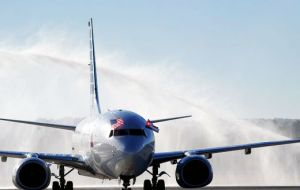MercoPress. South Atlantic News Agency
No music to mark American Airlines landing in Havana
 American Airlines flight #17 nonstop from Miami to Havana was of historical importance
American Airlines flight #17 nonstop from Miami to Havana was of historical importance Passengers from Miami, wearing straw hats provided by American Airlines with the word “Cuba” on the back, were greeted with welcome signs in various languages, but no music as the first scheduled commercial flight from the US to Havana in more than 50 years landed Monday to the applause of passengers and a water-spraying salute from firetrucks.
American Airlines flight 17 was an historic milestone that came on the heels of former Cuban leader Fidel Castro's death on Friday at the age of 90. The Boeing 737-800 landed during an official mourning period, as Cubans packed Havana's Plaza of the Revolution to join an homage to Castro, and a state-sanctioned live music ban hushed the capital's usually festive nightlife.
Several airlines began routes to other Cuban cities earlier this year. Later Monday, a JetBlue flight arrived in Havana from New York. Carnival Corporation launched its first cruise to the island this year, and Starwood Hotels became the first US hotel brand to operate on the island. In the weeks to come, eight more airlines will travel nonstop to Havana. Those airlines include United, JetBlue, Delta, Spirit, Frontier, Alaska and Southwest.
Despite the relaxing of travel restrictions, going to Cuba isn't exactly like hopping a flight to another Caribbean destination. Pure tourism remains illegal under US regulations that allow 12 categories of travel to Cuba. They include religious and sports activities and educational travel promoting “people-to-people” contact — which is the clause most United States citizens travel under.
For Americans without family ties to Cuba, the most popular form of travel had been on tightly focused educational trips organized in conjunction with the Cuban government. The Obama administration lifted that group requirement in March, leaving Americans free to travel to Cuba as long as they can credibly describe their trips as educational, which many see as the potential case since President-elect Donald Trump warned Monday he would reverse President Obama’s Cuba policy, unless the island nation institutes reforms.
“If Cuba is unwilling to make a better deal for the Cuban people, the Cuban/American people and the U.S. as a whole, I will terminate deal,” Trump tweeted.
A trade embargo imposed by Congress decades ago, which prevents American companies from doing business in Cuba, remains in place.
Trump stated on Saturday regarding the death of Cuban communist dictator Fidel Castro, “Today, the world marks the passing of a brutal dictator who oppressed his own people for nearly six decades. Fidel Castro’s legacy is one of firing squads, theft, unimaginable suffering, poverty and the denial of fundamental human rights. “While Cuba remains a totalitarian island, it is my hope that today marks a move away from the horrors endured for too long, and toward a future in which the wonderful Cuban people finally live in the freedom they so richly deserve.”
In contrast, Obama stated, “At this time of Fidel Castro’s passing, we extend a hand of friendship to the Cuban people. We know that this moment fills Cubans – in Cuba and in the United States – with powerful emotions, recalling the countless ways in which Fidel Castro altered the course of individual lives, families, and of the Cuban nation. History will record and judge the enormous impact of this singular figure on the people and world around him.”
Republican Sen. Marco Rubio, who is a member of the Senate Foreign Relations Committee and the son of Cuban immigrants, called Obama’s statement “pathetic” for “not mentioning whatsoever in that statement the reality that there are thousands upon thousands of people who suffered brutally under the Castro regime.”
Some in the travel industry remain hopeful that Washington will keep its Cuba policies intact and that Havana won't react by shutting off travel. ”We'll see what will happen with the Trump administration,“ said Alfredo Gonzalez, American Airlines' director for the Caribbean. ”We don't know exactly what will happen, but we can say that we are in Cuba, in the provinces, in Havana, and we will continue our service moving forward.“
Meanwhile, Delta Air Lines is banning for life a passenger who rudely professed his support for Republican President-elect Donald Trump and insulted those who didn't on a flight to Pennsylvania, the company's CEO said Monday. Edward Bastian said in an internal memo that the airline is also refunding the cost of tickets for other passengers on the Nov. 22 flight from Atlanta to Allentown. The man asks loudly: ”We got some Hillary bitches on here?“ He proceeds to clap and yell Trump's name a few times while other passengers seemingly try to ignore him, some staring at phones and tablets, others with arms folded. Referring to Trump's victory, he says: ”If you don't like it, too bad.”




Top Comments
Disclaimer & comment rules-

Read all commentsSurpring that the AA flight was authorized to fly to Havana, given the total ban-on-life in Cuba for 9 days...but I suppose it's fitting for a megalomaniac.
Nov 29th, 2016 - 08:06 pm +1Not so surprising was BO's pathetic statement, quite fitting for a socialist.
Presumably everyone wants the best for the Cubans trapped in the Castro regime, therefore I must agree with Trump's message to Raul Castro - ease up, or get lost.
Commenting for this story is now closed.
If you have a Facebook account, become a fan and comment on our Facebook Page!